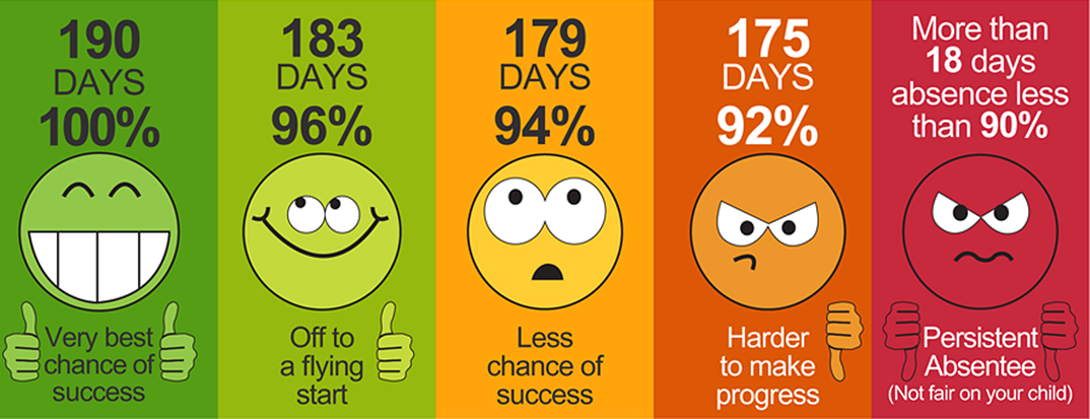Attendance
At Comberton Primary School, we believe that children should attend school regularly and arrive on time. Good attendance is crucial to effective learning and the continuity of the learning experience, therefore we place great emphasis on this in our communication with parents and carers. Regular attendance means the pupils can make the most of their education, improving their chances in adult life. It will help their social skills, such as making and keeping friendships. A regular and punctual attendance pattern will also help when they enter the world of work.
Children in England and Wales are required by law to attend school for just 190 days out of 365 each year. These days are organised into six periods or three terms, which leaves families with 13 weeks of designated holiday and an additional 5 days when school is closed for staff to undertake training days.

|
100% Perfect |
Well done! This will help all aspects of their progress and life in school. This will give your child a good start in life and supports a positive work ethic for their future. |
|
96-99.9% Good |
Well done - strive to build on this. |
|
90- 95.9% Concerning |
Absence is now affecting attainment and progress at school. School will monitor reasons for all absences with school office, family support worker and Headteacher. You may be required to attend meetings and work with the school urgently to improve the situation. |
|
Below 90% Unacceptable |
Absence is causing SERIOUS CONCERN. It is affecting attainment and progress and is disrupting your child’s learning. We will work with you, the school attendance governor, wider agencies and the Education Welfare Service, to improve your child’s attendance. This may be logged as a safeguarding concern. |
DfE Guidance for parents to emphasise the importance of working together to promote school attendance
- Guide for parents on school attendance
-
Take a look at our KPSA (Kidderminster Primary School's Alliance) poster as part of our collaborative approach to improving school attendance.
-

Why not enter WCF school attendance poster competition to help promote good attendance across the whole of Worcestershire?
-

Why is regular school attendance so important for my child?
Regular attendance means your child can make the most of their education, improving their chances in adult life. It will help your child's social skills, such as making and keeping friendships. A regular and punctual attendance pattern will also help your child when they enter the world of work.
What are my responsibilities regarding my child’s school attendance?
By law, all children of compulsory school age (5 to 16) must receive a suitable full-time education. As a parent/carer, you have a legal responsibility to make sure this happens - either by registering your child at a school or by making other arrangements to give them a suitable, full-time education. Once your child is registered at a school, you are legally responsible for making sure they attend regularly.
The local Authority has a duty to make sure that all parents/carers fulfil this responsibility.
How are the Department for Education and Education Welfare Service involved?
All schools have to maintain accurate and up to date attendance and absence records and allow remote access to this information by the EWS and the DfE for data collection.
Attendance data is supplied to the DfE. This enables them to track children for persistent absenteeism or absence patterns.
The Governing Body
In view of the volume of work expected from children to cover the National Curriculum requirements, the Governing Body strongly discourages parents from taking avoidable absences term time, as this is disruptive to the children’s education.
DfE Attendance Guidance makes it clear that head teachers may not grant any leave of absence during term time unless there are exceptional circumstances.
What this means?
As a school we will not grant holiday requests and therefore if your child is taken out of school for a ‘holiday’ during term time then we must record this as unauthorised absence and if the holiday extends beyond five school days then a penalty notice (fine) will be issued.
What will happen if my child does not attend school regularly?
- The school will contact you by letter or in person to raise any concerns about your child’s attendance. School may liaise with the Local Authority Attendance team for further advice.
- We may create an attendance support plan together.
- Your child’s attendance will be monitored by the school for signs of improvement.
- The Local Authority (LA) monitors all attendance closely, and will investigate if a child is regularly missing school.
What if my child’s school attendance does not improve?
If you continue to fail in your responsibility you may:
- Be given a certain amount of time to improve your child’s attendance.
- Be prosecuted in the Magistrates Court, which could lead to a fine or prison sentence.
How can I help my child attend school regularly?
- Talk to your child about school.
- Take a positive interest in your child's work, including homework.
- Keep in touch with your child’s class teacher.
- Support your child by attending Parents' Evening and other school events.
- Encourage your child to come to school.
How will regular school attendance help my child?
Regular attendance is a key factor in ensuring children make good progress. School gives your child a wide range of learning opportunities and experiences in the form of a creative curriculum, educational trips and school clubs, allowing them to develop their interests and achieve their full potential.
Regular school attendance means that your child can make the most of their education. Therefore, continuity of learning is essential.
What can I do to support the school?
- Contact school if your child is unable to attend for whatever reason.
- Provide the school with appointment cards/letter for any medical appointments.
- Routine appointment such as dentists and opticians should be made outside of school hours.
- Support school attendance by avoiding family holidays during term time.
- Work positively with the school to address any attendance concerns that have been raised.
- If you are unsure if your child is unwell, encourage them to attend school and then allow the school to contact you if we feel they need to go home.
